

France and U.S. Health Care: Twins Separated at Birth? - Megan McArdle - Business. Pascal-Emmanuel Gobry By way of introduction, I want to make clear that I have no particular expertise when it comes to healthcare policy.
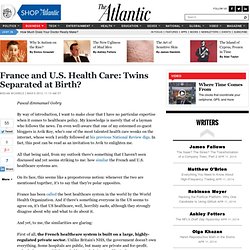
Affordable Health Care in Thailand and Costa Rica. This year, a few hundred thousand intrepid American travellers will head to places like Thailand and Costa Rica, in search of something that they can’t find in the United States.
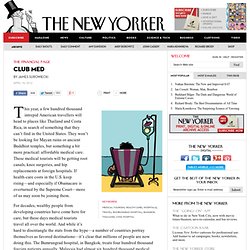
They won’t be looking for Mayan ruins or ancient Buddhist temples, but something a bit more practical: affordable medical care. These medical tourists will be getting root canals, knee surgeries, and hip replacements at foreign hospitals. If health-care costs in the U.S. keep rising—and especially if Obamacare is overturned by the Supreme Court—more of us may soon be joining them. For decades, wealthy people from developing countries have come here for care, but these days medical tourists travel all over the world.
It's Not About Broccoli!: The False Case Against Health Care - Einer Elhauge - National. The law's challengers argue that mandating insurance is like forcing Americans to buy more vegetables.

Here's what makes that logic so flawed -- and dangerous. Dick Morris/Flickr. Get Sick. Can't Pay? Go to Jail! Indeed, you can go to jail even if you don't owe any money if the collection company for your medical provider thinks you do:

National - Kevin Caves & Einer Elhauge - What a Nobel Prize-Winning Economist Can Teach Us About Obamacare. Ronald Coase's example of farmers and ranchers shows that the insurance mandate is about responsibility, not liberty. mrfoto/Shutterstock Ronald Coase won the Nobel Prize in Economics for showing that social costs are symmetrical.
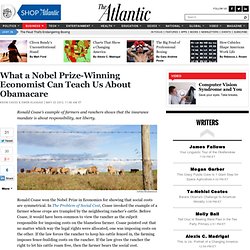
Trying to Catch His Breath With a Hole-Ridden Safety Net. I’m sitting here on a bed that constantly readjusts itself.

It’s terribly annoying and when I lay down on it there is a low rumbling of the motor that pushes air to my legs and sucks it from butt. The noise makes that grey matter between the ears in my head shake. Probably a malfunctioning bed, but it’s nothing to complain about given what is sitting next to me, 2 meters over, in the next adjustable bed. I’m at Carteret General Hospital on North Carolina’s scenic Crystal Coast, where I live. My beautiful, precious 6 year old son was admitted this past Tuesday for Pneumonia. "Don’t Follow America on Health Care" by Prabhat Jha. Exit from comment view mode.
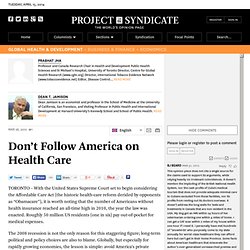
Click to hide this space TORONTO – With the United States Supreme Court set to begin considering the Affordable Care Act (the historic health-care reform derided by opponents as “Obamacare”), it is worth noting that the number of Americans without health insurance reached an all-time high in 2010, the year the law was enacted. Roughly 50 million US residents (one in six) pay out-of-pocket for medical expenses. Pre-existing conditions: The real reason insurers won’t cover people who are already sick. Jupiterimages/Thinkstock.
There are currently tens of millions of Americans without health insurance. Some can’t afford coverage at going rates. But as recently as 2009, one in seven applicants were rejected by the four largest insurance companies, who refused to sell them insurance at any price. Uninsurable Americans are mostly sick to begin with: They have heart disease, diabetes, cancer, and other pre-existing conditions that set off alarm bells for insurance sellers. Ask why the already-sick can’t buy insurance and you get an immediate and seemingly obvious answer—their health costs are too high. An intriguing answer to that question comes from Nathaniel Hendren, a graduating Ph.D. student at MIT, in a study that got him offers from economics departments at Harvard, Stanford, and Princeton, among others.
Our great healthcare denial. If you follow national debates about health care, surely you remember the story: It was the fall of 2007, and then-President Bush had recently vetoed an expansion of the State Children’s Health Insurance Program (S-CHIP).
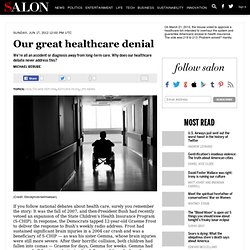
In response, the Democrats tapped 12-year-old Graeme Frost to deliver the response to Bush’s weekly radio address. Frost had sustained significant brain injuries in a 2004 car crash and was a beneficiary of S-CHIP — as was his sister Gemma, whose brain injuries were still more severe. After their horrific collision, both children had fallen into comas — Graeme for days, Gemma for weeks. Supreme Court and Obamacare: why the conservatives are skeptical of the Affordable Care Act. Chip Somodevilla/Getty Images.
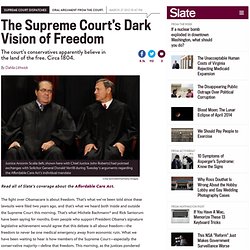
Affordable Care Act, the Supreme Court, and the Constitution: Harvard law professor Einer Elhauge shows how the Founding Fathers supported mandates. National Archives/Getty Images.

The 'Obamacare' challenge to American individualism. Early in the morning, half awake, I heard my husband let out a whooping cheer from somewhere in the house. “I can’t believe it,” he kept saying. Like most of my friends, he--a Director of Public Health--- was sure the Supreme Court would never uphold the patient Affordable Care Act (ACA), President’s Barack Obama’s signature effort of his years in office. Designed to increase the number of people covered by health insurance, by restructuring the fragmented, expensive and ineffective American health care system, Congress passed this historic—though very imperfect---bill in 2010. Republicans, nearly apoplectic, argued that the ACA violated the Constitution because it required each individual to buy medical insurance. We’re getting wildly differing assessments. The announcement of the Supreme Court’s decision largely upholding the Patient Protection and Affordable Care Act on Thursday, June 28 precipitated a genuine media drama.
Millions tuned in to get the result in real time, and were rewarded with the spectacle of two major news networks reporting the story incorrectly. Indeed, the President himself was in limbo while his staff raced to find out whether the Court had struck down his signature policy initiative. America: Where It's Easier to Get a Gun Than Good Mental Health Care. Photo Credit: Tony Webster June 10, 2012 | Like this article? Join our email list: Stay up to date with the latest headlines via email. Obamacare, Citizens United, and the Supreme Court’s Independence. Originally, the Supreme Court of the United States met in a drafty room on the second floor of an old stone building called the Merchants’ Exchange, at the corner of Broad and Water Streets, in New York. The ground floor, an arcade, was a stock exchange. Lectures and concerts were held upstairs. For meeting, there weren’t many places to choose from.
Much of the city had burned to the ground during the Revolutionary War; nevertheless, New York became the nation’s capital in 1785. Politics - Tom Perriello - The Real Affordable Care Act Battle: Constitutionalists vs. Confederates. Dark money middlemen. By now, you probably know that the Supreme Court’s Citizens United decision allows outside groups to raise and spend unlimited amounts of money on elections.
The Supreme Court Upholds Obamacare - National. In a 5-4 decision authored by Chief Justice John Roberts, the Affordable Care Act has been upheld by the Supreme Court. Why Justice Roberts' Opinion Could Set Alarming Precedents. June 28, 2012 | Like this article? Many hospitals, doctors offer cash discount for medical bills.